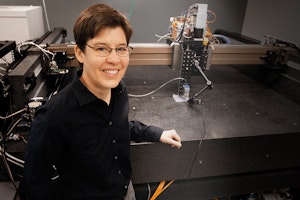(CAMBRIDGE, Massachusetts) — Harvard materials scientist Jennifer A. Lewis, Sc.D., whose innovative work in microscale 3D printing is advancing the development of 3D printed tissue structures, flexible electronics, and new materials, has been selected as a 2016 National Security Science and Engineering Faculty Fellow (NSSEFF) by the Department of Defense (DoD). Lewis is a Core Faculty Member at the Wyss Institute for Biologically Inspired Engineering and the Hansjörg Wyss Professor of Biologically Inspired Engineering at the Harvard John A. Paulson School of Engineering and Applied Sciences (SEAS).
The five-year, $3 million award funds long-term, unclassified basic research of strategic importance to the DoD, engaging outstanding scientists and engineers from U.S. universities in addressing the most challenging technical issues facing the department.
Lewis is among 15 other awardees to receive the fellowship this year. She is joined by Hongkun Park, Professor of Chemistry and Chemical Biology and of Physics at Harvard. In total, there are now 32 current Fellows.
 Jennifer Lewis, Ph.D., Core Faculty Member at the Wyss Institute at Harvard University and the Hansjorg Wyss Professor of Biologically Inspired Engineering at the Harvard John A. Paulson School of Engineering and Applied Sciences (SEAS). Credit: Wyss Institute at Harvard University
Jennifer Lewis, Ph.D., Core Faculty Member at the Wyss Institute at Harvard University and the Hansjorg Wyss Professor of Biologically Inspired Engineering at the Harvard John A. Paulson School of Engineering and Applied Sciences (SEAS). Credit: Wyss Institute at Harvard UniversityLewis is a pioneer of 3D printing and is developing of new classes of printable materials and solid free-form fabrication techniques. She and her team have developed 3D printing of functional and biological inks at the microscale, and have opened new avenues for fabricating novel devices such as 3D antennas, electronic sensors and rechargeable microbatteries, and have revolutionized bioprinting of vascularized living tissues.
To date, Lewis has authored over 150 papers and is an inventor on more than 30 issued and pending patents. As a professor at SEAS, she teaches an innovative course on biomaterials that introduces undergraduates to the biomedical tools of the future.
She has received numerous other distinctions, including the NSF Presidential Faculty Fellow Award, the Brunauer Award from the American Ceramic Society, the Langmuir Lecture Award from the American Chemical Society, and the Materials Research Society Medal. She is a Fellow of the American Ceramic Society, the National Academy of Inventors, the American Physical Society, the Materials Research Society, and the American Academy of Arts and Sciences.
